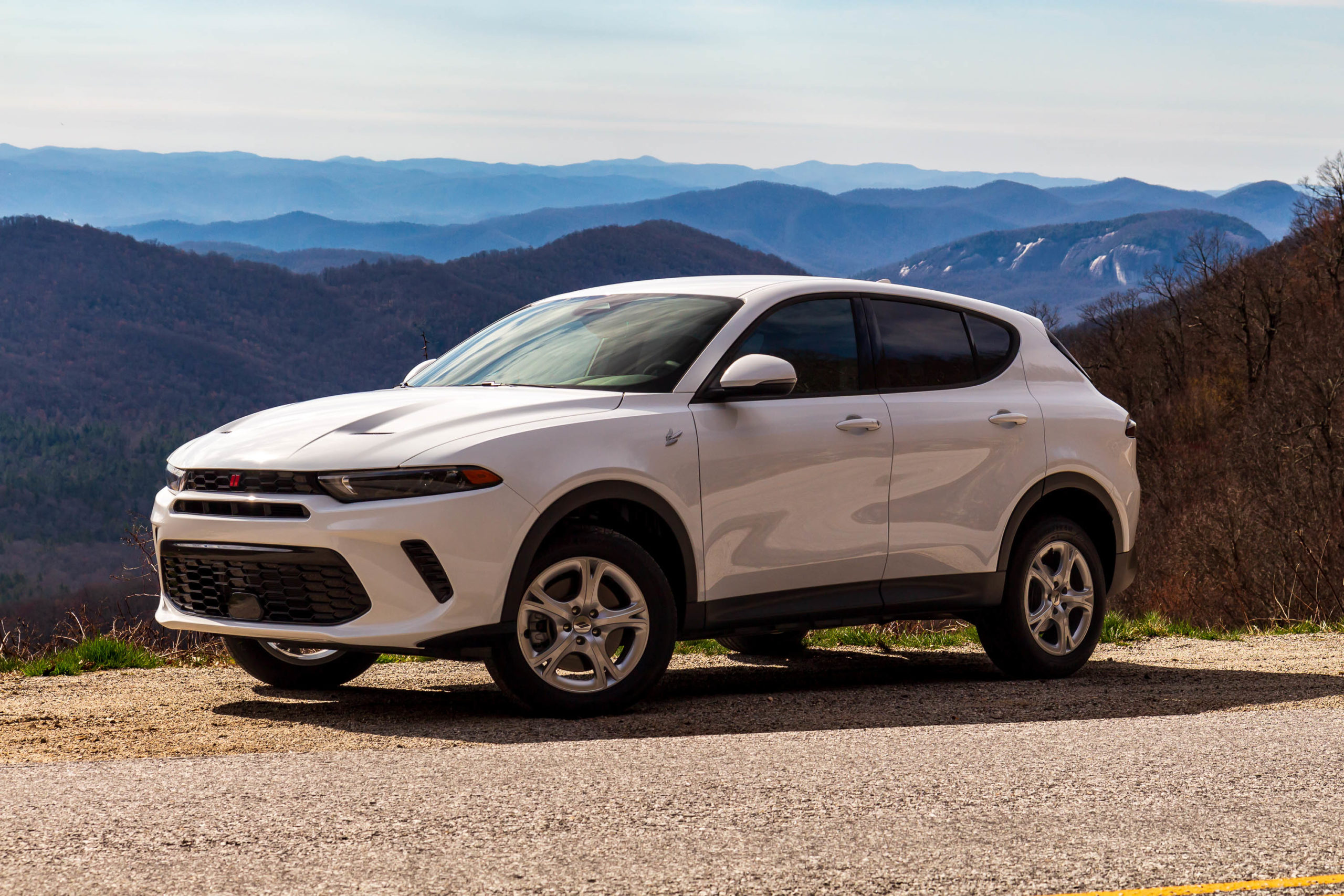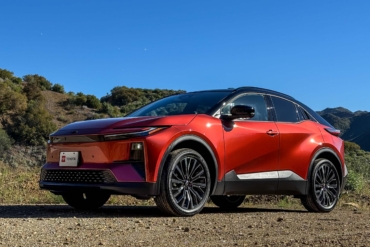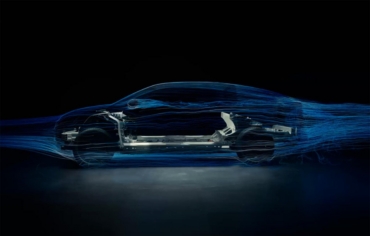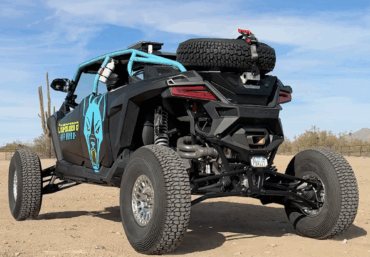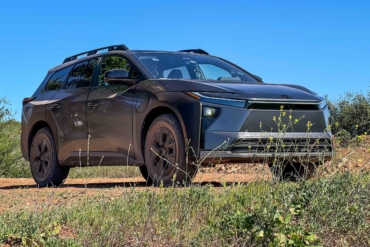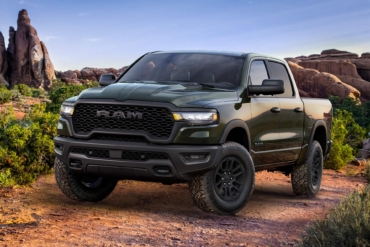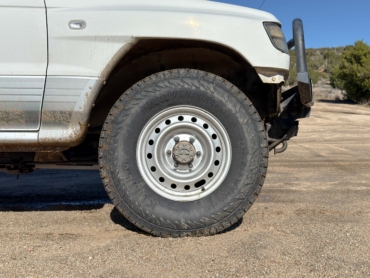The little Hornet is a big deal for Dodge. The Detroit automaker hasn’t had a new vehicle in more than a decade. Heck, it hasn’t had anything at all in the compact crossover segment since 2011.
Since the compact crossover segment is almost a third of the total U.S. new vehicle market, that leaves a gaping hole in the company’s lineup. With no model recognition and a highly competitive segment, Dodge had to do something more than just show up. It had to innovate.
Dodge has tried to make that innovation an extension of its bigger models. They are pitching this as its entry-level muscle car — a gateway to Charger and Durango. But as I’ll discover in the Blue Ridge mountains around Asheville, North Carolina, this is no muscle car. It’s something much more refined. And much more enjoyable.
In short: A compact crossover for drivers, the Dodge Hornet makes no pretense of being a rugged off-roader. The little crossover is better for it, giving the segment a very different option than has existed before.
- Engine: GT 2.0L Turbocharged inline-four; R/T 1.3L Turbocharged inline-four with electric motors
- HP/Torque: GT 268/295; R/T 288/383
- MPG: GT 21/29/24 City/Highway/Combined (R/T TBA)
- Cargo: GT 27 cu. ft., 54.7 cu. ft. w/ seats folded; R/T 22.9/50.5
- Towing: 2,000 lbs.
Pros
- Peppy performance
- Fun to drive
- Upscale interior
- Stylish looks
- Excellent ride
- 35-mile PHEV
Cons
- Small cargo capacity
- No roof rails
- Low ground clearance for R/T
- Poor EPA fuel economy ratings
- 9-speed sluggish when pushed
Dodge Hornet Has Italian Roots

The 2023 Dodge Hornet — the PHEV R/T is the 2024 model year — didn’t learn its lessons from stablemate Jeep. Instead, Dodge leaned on its Italian corporate siblings at Alfa Romeo. This Dodge went to an Italian tailor and engineer.
Thanks to its Alfa roots, Dodge has two engine options for the Hornet. GT and R/T get very different powertrains, with the latter becoming Dodge’s first plug-in hybrid electric vehicle (PHEV) model.
The Hornet GT gets a 2.0L turbo-four engine called Hurricane. With 268 horsepower and 295 pound-feet of torque, it offers serious juice for the class. It makes more power than any crossover under $30,000 and has more power than luxury crossovers like the Porsche Macan, which costs double its MSRP.
R/T is a plug-in hybrid. A 1.3L turbo-four drives the front tires (with occasional help from the small belt-driven motor-generator), and an electric motor turns only the rears. The total is 288 horsepower and 383 pound-feet of torque.
2.0L GT Encourages You to Haul

GT’s 2.0L has a nine-speed automatic, and the R/T’s 1.3L is a six-speed. Both get all-wheel drive (AWD) as standard equipment, but the R/T does it without a center driveshaft thanks to the rear-mount electric motor.
The 2.0L GT is refreshingly quick. This is a segment where 200 horsepower is a rarity; adding nearly 70 to that makes it the hot one in the group. The engine pulls hard all the way to redline.
Better yet, the engine makes good noises when you’re wringing its neck. Quiet noises, but nothing intrusive. A bit more growl from the exhaust would be nice, though that is coming later via Direct Connection, Dodge’s line of factory-authorized go-fast parts.
In normal driving, the nine-speed is quick to grab gears and mostly just stays out of your way. That’s not exactly interesting, but a transmission that you don’t notice is a plus at this price point.
Hornet Happiest on a Back Road

Hornet doesn’t encourage normal driving, though. This is a crossover that wants to go quickly down a back road thanks to its Italian roots. Start to hustle, and the driveline loses a bit of its polish.
Torque steer and wheelspin from the front tires are a sign of reluctance to send power to the rear tires. The transmission gets equally sluggish, not downshifting until you’re well into the throttle, then grabbing a lower gear with a bang. Sport mode helps a bit, and the manual mode helps a bit more. But the Hornet GT could really use a set of paddles instead of the selector stick.
Normally a transmission that’s slow to shift in a hurry isn’t a problem for a compact crossover. This is a segment that, as a rule, doesn’t want you to drive with anything approaching enthusiasm. Not the Hornet, though. It wants you to be in a hurry.
Fun Handling Without Harsh Ride

The eagerness to hurry shows in more than just the driveline. The Hornet (GT and R/T) has quick steering with more feel and weight than anything in this segment. The GT’s ratio is a bit quicker than R/T’s, but both dive into corners with an enthusiasm normally reserved for much pricier Euro sports rides.
Hornet encourages you to make full use of the tires, even if they’re the 17-inch eco specials mounted to the ugly base silver wheels. In the Hornet, for the first time, I want my compact crossover’s gearbox to be more aggressive. Dodge, what have you done?
Even more impressively, the Dodge Hornet delivers that handling with excellent ride quality. Sure, the roads around the usually-warm Asheville area weren’t cratered with potholes like my usual drive routes, but I was able to find some rough stuff like gravel parking lots and perpetual-construction Interstate highways.
On those roads, the standard Koni FSD shocks show their capabilities. Frequency Selective Damping in the shock changes how the shock responds based on the movement. Roll and big body motions are reduced, but bump impacts are absorbed.
The combination of ride and low cabin noise levels should make all-day touring a breeze.
Hornet R/T Dodge’s First PHEV

Back to the powertrains for a moment because I haven’t forgotten about the R/T plug-in. Its extra power is somewhat dampened by about 400 pounds of extra weight, but this is still a quick compact.
The rear motor and front engine work well together. There aren’t gaps between the two power sources coming online, and the electric motor covers the torque drop when the automatic transmission is at work. So it doesn’t have the same transmission shift issues when you’re going fast, like the GT.
Switch to electric-only mode, and you have a rear-drive vehicle with 121 horses and 184 torques. It’s not fast, but the Hornet R/T is fine in everyday driving in this mode. Plus, all of the power is just a button press or full throttle (there’s a noticeable detent before you kick in the gas) away.
R/T has another trick called PowerShot. Hit Sport mode and hold both paddles (R/T has shift paddles). The ECU quickly scans battery charge and temps and then engages PowerShot, illuminating a white tire icon on the dash.
Floor the gas, and you get up to an extra 25 horsepower for a total of 313. You can access that power for 15 seconds before it goes away. Wait for another 15 seconds or so, and you can do it again.
The feature is cool but not as interesting or noticeable as we would have liked.
Dodge is big on donuts and burnouts. So can you do them with the Hornet R/T? Probably, but only in the snow.
PHEV Boasts 35-Mile Electric Range

The official estimated range for the R/T is 35 miles from the 15.5-kilowatt-hour battery. Driving quickly, I was able to hit that figure with no problem. You can select charge save and hybrid modes, but there’s no specific “charge” setting. Sport mode, though, will charge it back up quite quickly if you’re ok with the rest of the Sport mode tweaks.
On a Level 2 fast-charger, 7.4-kilowatt charging means it should be ready to go in about 2.5 hours.
Official fuel economy ratings for the Hornet GT put it at 21 miles per gallon city and 29 highway. Those figures are middling for the segment, but I’m optimistic about how it will do in the real world. That’s because while using all of the Hornet’s sting in the Blue Ridge Mountains, I saw an indicated 25 miles per gallon. Drive like a normal person, and that 29-figure should be easy to beat.
Dodge didn’t have official economy figures available for the PHEV. That said, using mostly electric power, I saw 75 miles per gallon on the in-dash display.
Standard AWD Means Rough-Road Capability

While all-wheel drive is standard, the Dodge Hornet is one of the only crossovers (and certainly the only one at this price point) where its marketing team is completely ignoring drivers who want to go off-road.
That doesn’t mean it’s not capable. Eight inches of ground clearance in the GT model is plenty for this size of crossover. It’s only about half an inch less than the Toyota RAV4 or Subaru Forester. The R/T’s 6.1 inches will have a tougher time clearing rocks, but both should be fine for rough roads and many two-track trails without big rocks.
Track Pack Puts Priority on Pavement

On-pavement handling is clearly the priority. So expect the ride on those rough roads to be stiffer than most crossovers. The 55 and 40-series sidewalls on the 18 and 20-inch wheels probably won’t take much abuse, and they’re not going to cushion your ride much.
On the other hand, the 40-series tires are on 20-inch wheels and come with larger brakes and two-stage shocks as part of the Track Pack. If you’re buying anything called the Track Pack, you should probably not expect to be going off-road.
Dodge Hornet: Cargo Capacity

GT models have 27 cubic feet behind the back seats with a high floor opening. The seats fold mostly flat, opening up 54.7 cubic feet of space.
An even higher floor in the R/T to hold the battery cuts space by about four cubic feet, giving it 22.9 and 50.5, respectively. These are all small for Hornet’s size, which is not surprising given the stylish shape that cuts into rear space.
No Factory Roof Rail Offering
Dodge is not planning to offer the Hornet with roof rails or racks. There will be an accessory roof rack from Mopar down the road, but Dodge staff couldn’t say how long the wait would be. It’s also not clear how it would attach since there are no built-in mounts on the top of the Hornet.
If you’re planning to tow, the Hornet can haul a 2,000-pound trailer with either driveline. That’s enough for a very small pop-up or a trailer with dirt bikes. Or something else small and light.
Muscular Dodge Styling

The Hornet keeps its Alfa styling, for the most part. It’s a handsome design. One that manages to stand out in a segment where looking different is tough.
Dodge’s biggest styling inputs are in the nose. There, the Hornet gets a smaller version of the same headlight treatment as the Durango and Charger. The effect makes this little CUV look wider than it is. It also gives it just enough aggression that it won’t look out of place at a Dodge dealer.
Twin vents on the hood are the other Dodge styling link. Those extractor vents are more than just cosmetic, too. They help move warm air out from under the hood and should help the Hornet’s aerodynamics slightly.
Cabin Feels More Lux Than Most in Class

Hornet’s cabin reminds me of Mazda’s current designs. A big compliment since Mazda is currently building the swankiest interiors short of full-on luxury brands.
The cabin feels wide and airy. The materials almost all feel top-notch, except for the volume dial. Dodge doesn’t seem to want you to use it since the dial is hidden down to the right of the gearshift. Use the buttons on the front of the wheel instead.
While I found the seat bottoms short for my height, the cabin had plenty of room. I could sit behind myself, in comfort, even in a Hornet equipped with a large panoramic sunroof. Watch those rear doors, though. The stylish glass pokes out further than it looks, just waiting to snag you.
Loads of Tech and Standard Features

The hornet gets a 10.25-inch screen running UConnect 5. The system is used across the Stellantis line and is quick, responsive, smooth, and, crucially, easy to use.
Wireless Android Auto and Apple CarPlay are both standard. The system can also let you swap Bluetooth connections between two devices. UConnect also allows for loads of customizable configurations, including different gauges on the standard 12.3-inch digital dash display.
Dodge has equipped the Hornet well. The sub-$30,000 base model has adaptive cruise, big screens, ambient cabin lighting, and cloth on the seats that is a technical fabric that feels unlike any cloth seats I’ve experienced before.

GT Plus adds ventilated leather seats, power seat adjustment, Harman Kardon Audio, nav, and the Cold Weather Group. For $41,590 (before tax incentives), R/T is equipped like a GT with the Cold Weather Package and power seats. The R/T Plus is equipped like a GT Plus.
There are just four option packs, one with gloss black trim, one for heated seats and steering wheel, one with more high-tech driver assistance, and the Track Pack. R/T trims don’t offer the cold weather pack since they already get those features standard.
2023 Dodge Hornet Review Conclusion

I stepped into the 2023 Dodge Hornet expecting something brash, unruly, and dated. That’s what Dodge has traded on for the last decade, after all. Instead, I found a compact crossover that managed to stand out in a sea of Chevy Equinox, Toyota RAV4, Honda CR-V, and other bland attempts at faux ruggedness.
The Hornet isn’t a crossover for people who want to go off-roading. It’s a crossover that’s great in town, a delight on twisty roads, and can help you bring your bikes, hiking boots, or camping gear to the trailhead. Just not down it.
If you want to smash down the trail, get a Jeep. If you want to enjoy the drive to get there, take a look at the Hornet. GT arrives first, but it and R/T should be in dealers by late spring.

